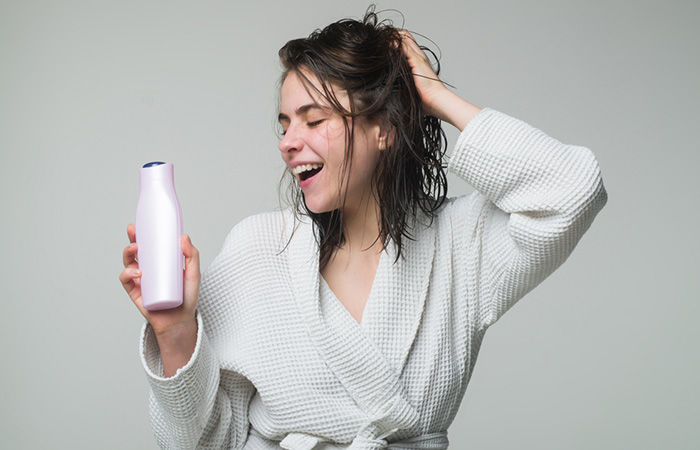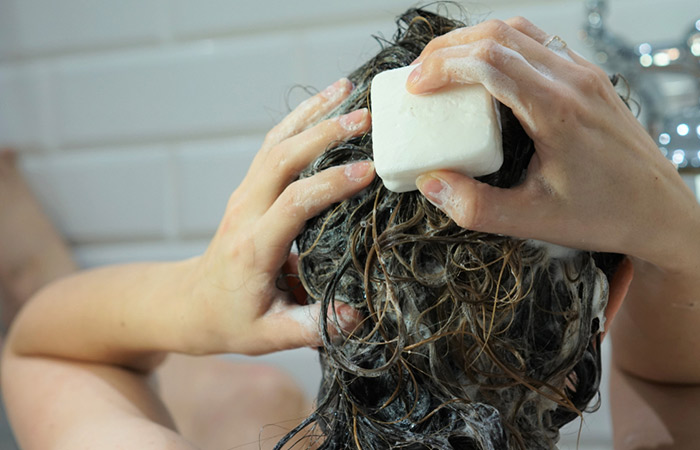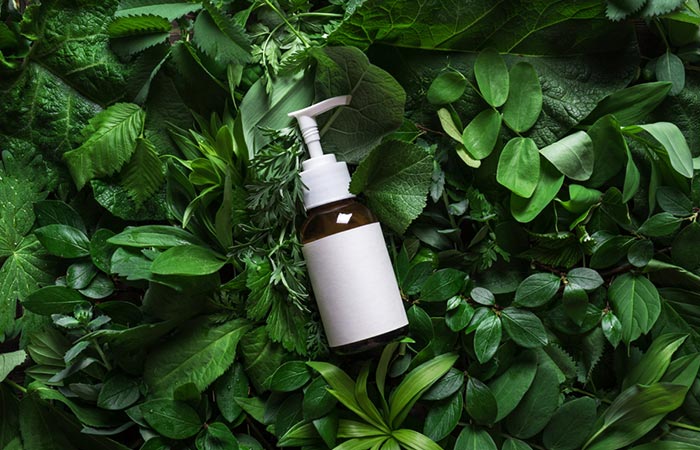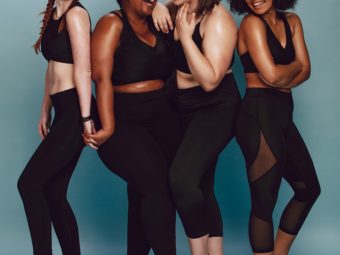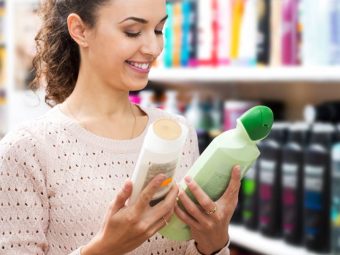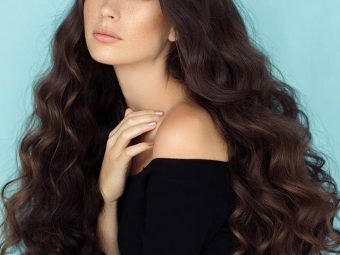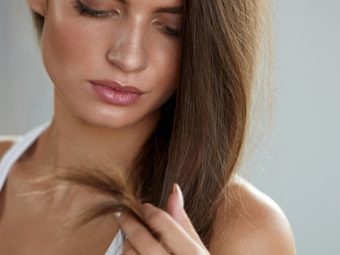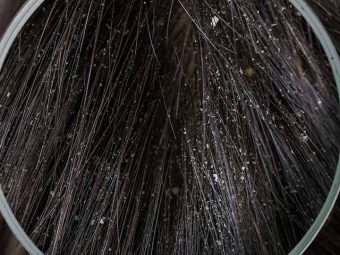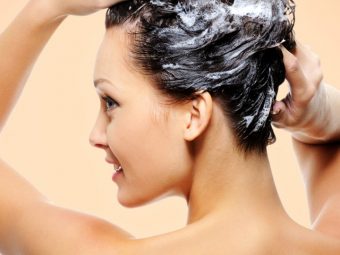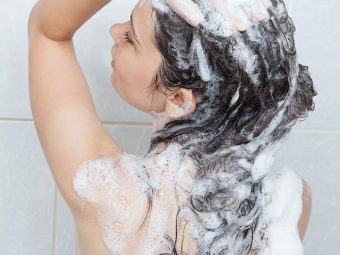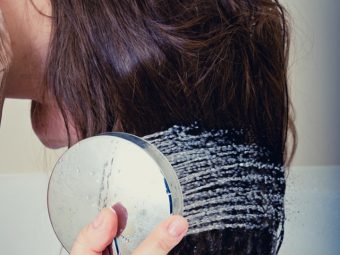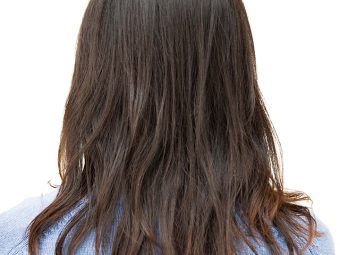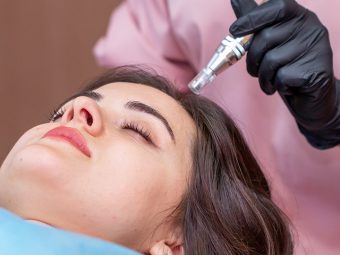The 12 Different Types Of Shampoo: Which Type Is Right For You?
Know what sets each shampoo apart to pick the best one for your hair needs.
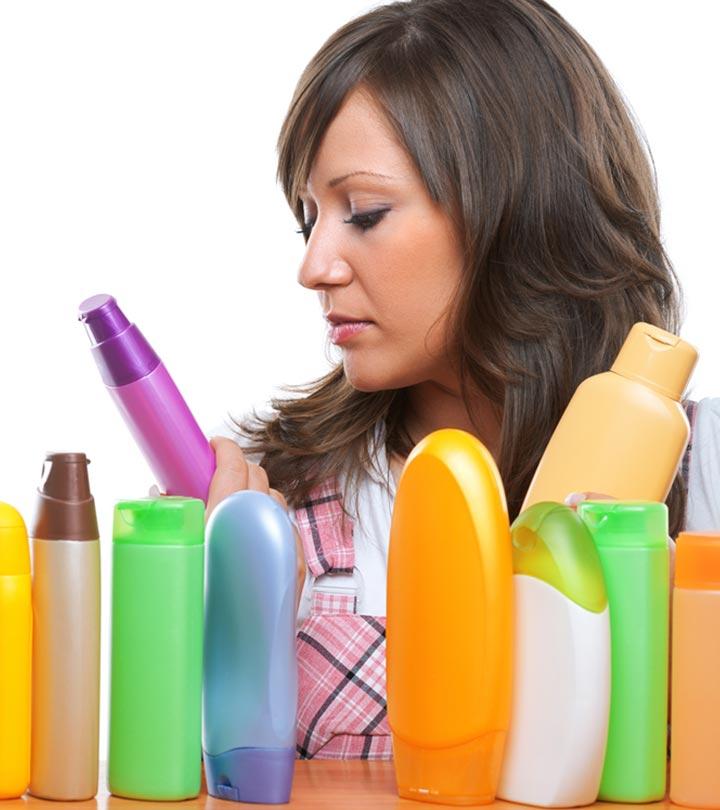
Image: Shutterstock
We all have different hair types causing different issues. We even have different scalp types. Hence, understanding the different types of shampoos available is important.
People with dry hair issues should not use shampoos for oily hair, and vice versa. Likewise, if you have curly or coily hair, a shampoo designed for straight hair wouldn’t be suitable. To resolve your hair issues and achieve healthy, glossy hair, you need a complete understanding of all the shampoo varieties available. Read to learn which shampoo is right for you.
In This Article
The History Of Shampoo
The concept of shampoo dates back thousands of years. Ancient civilizations, like the Mesopotamians and Egyptians, used various natural ingredients to cleanse their hair, including ashes, oils, and herbal extracts. In India, soapberries, known as reetha, were widely used for hair cleansing.
The term ‘shampoo’ comes from the Sanskrit word ‘champu,’ which means ‘massage.’ Shampoo, as we recognize it today, became popular in the early 20th century. The first commercially available liquid shampoo was introduced in the 1920s. Initially, it was considered a luxury product, but its popularity grew rapidly.
Today, the global shampoo industry continues to innovate, offering a wide array of products catering to different hair needs, textures, and preferences.
Now that we know the history of shampoo, let’s understand if your choice of shampoo depends on your hair type.
Can The Hair Type Influence The Shampoo You Choose?
Yes. Not all shampoos work on all hair types. While dry scalp can go days in-between hair washing, oily strands and scalp may require frequent shampooing. Shampoos contain cleansing and conditioning ingredients. The percentage of each ingredient differs according to the hair type.
Choosing the right shampoo is important for effective hair care. It plays a key role in grooming, beauty, and personal hygiene that ensures optimal scalp health, encourages hair growth, and enhances hair texture. Shampoos may also help boost hair shine and improve hair volume. Let us understand how your hair type may influence your choice of shampoo.
- Shampoo For Fine Hair
If you have fine hair, avoid shampoos with more percentage of conditioning ingredients as they may weigh it down. Shampoos containing more cleansing ingredients are suitable for fine hair.
- Shampoo For Thick Hair
Thick, coarse, and rough hair should avoid shampoos with harsh cleansing ingredients (like SLS). Such ingredients can raise the hair cuticles, making the hair dry and frizzy. Use shampoos with more percentage of conditioning ingredients, like nourishing oils and plant butters, to keep the hair soft and smooth.
- Shampoo For Greasy Hair
A greasy scalp produces excess oil, causing buildup. Use shampoos with surfactantsi XA chemical substance that reduces the surface tension of a liquid, allowing lathering and foaming. It can act as a detergent, foaming agent, or emulsifier. and oil-absorbing ingredients like clay to prevent excess oil and sebum buildup.
Now, let’s take a look at all the different types of shampoo available on the market.
12 Different Types Of Shampoos For Different Hair Types
Take a look at some of the different types of shampoo that might be right for your hair. With an understanding of different types of shampoo, you can help choose the right shampoo that meets your hair needs.
1. Regular Shampoo
This is a daily use shampoo suitable for people who do not have any specific hair needs. It is mild and contains a low percentage of cleansing agents. Regular shampoos suit all hair types.
2. Clarifying Shampoo
Hairstyling products like sprays and creams cause residue buildup. A clarifying shampoo contains a high percentage of sodium lauryl sulfate (SLS) that helps remove product buildup. It is best for oily and greasy scalp and for people who use hair styling products. However, use clarifying shampoo once in two weeks to avoid damaging your hair and causing scalp imbalances due to the drying nature of clarifying shampoo. Always follow up with a conditioner.
3. Protein Shampoo (Anti-Breakage Shampoo)
Keratin (hair protein) is essential for maintaining the hair structure, and protein loss can cause damaged hair. Such hair is breakage-prone, rough, and extremely fragile. Protein shampoos contain hydrolyzed keratin or plant proteins that strengthen damaged hair and add a healthy shine to it.
4. Volumizing Shampoo
A volumizing shampoos is best for fine and limp hair. It has a lightweight formula that does not weigh the hair down. Volumizing shampoos lift the roots to give a fuller and bouncy look to your hair.
5. Shampoo Bars
Shampoo bars contain less amount of water compared to the traditional liquid shampoos and have a soap-like appearance. They often contain natural ingredients and are best for those who travel a lot. Depending on the formula, shampoo bars may or may not lather.
6. Color-Safe Shampoo
Color-safe shampoos contain ingredients that will not fade your hair dye. These shampoos can keep your colored hair moisturized, protected, and hydrated. They are suitable for all hair types.
7. Moisturizing Shampoo
If you have dry and frizzy hair, this type of shampoo is suitable for you. Moisturizing shampoos contain a high percentage of moisturizing ingredients like aloe vera, oils, shea or cocoa butter, and silicones that moisturize the hair and help prevent its dehydration.
8. Natural Or Organic Shampoo
Natural shampoos contain plant-based ingredients and are devoid of any artificial preservatives like parabens and PEG and other harsh ingredients like alcohol, sulfates, phthalates, and silicones. These shampoos are suitable for all hair types, especially those who have sensitive scalps..
9. Anti-Dandruff Shampoo
Anti-dandruff shampoos soothe itchy scalp and prevent flaking and dandruff. They are formulated with ketoconazole to treat dandruff, help condition the hair, and minimize hair fall.
10. Chlorine Removal Shampoo Or Swimmers Shampoo
This shampoo is specially designed for swimmers. Chlorine exposure strips the moisture from your hair. A chlorine removal shampoo removes chlorine residue and odor while replenishing the lost moisture. It contains protective conditioners that keep your hair nourished and soft.
11. Dry Shampoo
Dry shampoos are for refreshing your hair between washes. They are available in liquid, powder, and aerosol spray forms. You can spread the product through the roots and let it absorb grease and oil. Comb your hair and ta-da! Dry shampoo is good for all hair types but works especially well on oily and greasy hair.
 Quick Tip
Quick Tip12. Curl-Defining Shampoo
Natural hair tends to be dry and frizzy. Curl-defining shampoos contain hydrating ingredients, amino acids, and hydrolyzed proteini X A large protein molecule is broken down or hydrolysed into its smaller components, amino acids and peptides, that seep through hair shafts and strengthen hair strands. that moisturize the hair and define your curls.
You may pick any of the shampoos as per your hair type or use a mix of them. Find out which shampoos might suit your hair in the next section.
Which Shampoo Type Is Right For You?
Always pick a shampoo that has the right ingredients and addresses your hair needs.
For Oily Hair
- Use a volumizing shampoo if you have fine hair. Avoid moisturizing shampoos.
- Use a clarifying shampoo once a week.
For Dry Hair
- Use shampoos that contain moisturizing ingredients.
- Avoid shampoos with sulfates and alcohol.
For Natural Hair
- Use a mix of protein, moisturizing, and curl-defining shampoos.
- Pick a shampoo-type that addresses your hair needs.
For Combination Hair
- Use a regular shampoo as this will not weigh your hair down or dry it out.
- Use a combination of different shampoos as per the results you want.
 Quick Tip
Quick TipBefore picking a shampoo, ensure it has the right ingredients. Avoid any shampoo that contains any of the ingredients mentioned below.
Shampoo Ingredients You Should Avoid
- Sulfates
Sulfates are common surfactants found in most commercially available shampoos. Regular use of sulfates causes dryness and breakage. Avoid shampoos containing SLS and SLES if you intend to use them regularly.
However, there is an exception. Clarifying shampoos contain high levels of sulfates and can remove product buildup. Such shampoos should be used not more than once or twice in two weeks.
- Silicones
Silicones can make your hair smoother but cause product buildup. Avoid buildup-causing silicones like dimethicone, cetyl dimethicone, dimethiconol, cetearyl methicone, cyclomethicone, amodimethicone, stearyl dimethicone, trimethylsilylamodimethicone, and cyclopentasiloxane.
However, not all silicones cause buildup. You may use products containing water-soluble silicones like stearoxy dimethicone, dimethicone copolyol, and behenoxy dimethicone.
- Quaternary Ammonium
This is also known as quats and is used as a conditioning agent in shampoos. It may cause skin irritation. Hence, it is better to avoid it.
- Artificial Fragrances
Avoid shampoos that contain artificial fragrances. They may irritate your skin and cause allergic reactions like rashes and hives.
- Polyethylene Glycol Or PEG
This petroleum-based compound is used as a softener and thickener in shampoos and may irritate sensitive skin.
- Phthalates
Phthalates are chemicals that soften plastic. They are widely used in products like shampoos, soap, moisturizers, and food. There is not much research regarding the side effects of phthalates. However, it is suspected that they interact with other chemicals and cause chronic health issues and birth defects (1).
- Parabens
Parabens are preservatives used in shampoos and other cosmetic products. Studies regarding the health implications of parabens are conflicting. Parabens have estrogenici XRelating to or denoting estrogen, the sex hormone responsible for the female reproductive system and sexual development. properties, and researchers have hypothesized that they might play some role in breast cancer development (2).
Infographic: Common Hair Types + The Right Shampoos To Use
Your hair needs special care, so we recommend using a shampoo that suits your hair type. For example, if you have dry hair issues, you must not use shampoos formulated for oily hair and vice versa. Similarly, if you have curly hair, you must use a shampoo that hydrates and maintains your curls. Knowing your hair type and what shampoo to use can solve many issues related to your hair and scalp. Check out the following infographic for a quick guide! Illustration: StyleCraze Design Team
Save the high-quality PDF version on your device now.
Download Infographic
Knowing which shampoo to use is determined by your hair type and scalp type. From regular and clarifying shampoos to natural and anti-dandruff shampoos, there are 12 different types of shampoo, each formulation aimed at specific concerns and functions. For example, dry shampoo will not work for you if you already have dry hair. In this case, you must go for a product that moisturizes your tresses and nourishes them. The key here is to choose the shampoo with the right ingredients and avoid those with sulfates, silicones, artificial fragrances, parabens, etc.
Frequently Asked Questions
Can I use 2 shampoos?
Using two shampoos together may strip away your hair’s natural oils. If you wish to reap the benefits of two different shampoos, you may wash your hair with one shampoo and, after 2-3 days, wash it with the other shampoo.
What is conditioner shampoo?
Conditioner shampoo, also known as co-washing, is a type of shampoo that is designed to cleanse and condition the hair at the same time. It is formulated with gentle cleansing agents that remove dirt and oil from the hair without stripping it of its natural oils. At the same time, it contains conditioning agents that help to moisturize and detangle the hair, leaving it soft, smooth, and manageable.
What is the pH of shampoo?
The pH of shampoo can vary depending on the specific product and formulation. However, in general, most shampoos have a pH range of 4.5 to 6.5. This slightly acidic pH range is important because it helps to maintain the natural pH balance of the scalp and hair, which is typically between 4.5 and 5.5.
How do I choose the right shampoo for my hair type, and what are some common mistakes to avoid when selecting shampoo?
Choosing the right shampoo for your hair type can be important in maintaining healthy and beautiful hair. Here are some tips for selecting the right shampoo:
• Determine your hair type
• Consider any scalp issues
• Read the label to look for a shampoo that is free of harsh chemicals
Some common mistakes to avoid when selecting shampoo include:
• Choosing a shampoo based on fragrance alone
• Over-washing
• Using too much shampoo
• Not rinsing thoroughly
Can using the wrong type of shampoo damage your hair or scalp, and if so, what are the potential consequences?
Yes, using the wrong type of shampoo can damage your hair or scalp, and can lead to a range of potential consequences such as dryness as using a shampoo that is too harsh or not moisturizing enough can strip your hair of its natural oils Oiliness can be caused by using a shampoo that is not designed for your hair type can cause your scalp to produce excess oil. Certain chemicals in shampoo may cause irritation to the scalp, leading to itching, flaking, or even a rash. If you have color-treated hair, using the wrong type of shampoo can cause your color to fade more quickly. In extreme cases, using the wrong type of shampoo can lead to hair loss or damage to the hair follicles.
Key Takeaways
- The type of shampoo you use depends on your hair type and concern.
- A regular shampoo contains mild cleansing agents suitable for all hair types.
- People with dry hair should pick a shampoo that has hydrating ingredients.
- Similarly, people with oily hair should use volumizing shampoo to give fuller and bouncier hair.
- Avoid shampoos that contain sulfates, silicones, and other harmful chemicals as they cause dryness and may irritate the skin.
Check out this video to learn about the different types of shampoo and their uses! From volumizing to clarifying, find the perfect shampoo for your hair type.
Sources:
Articles on StyleCraze are backed by verified information from peer-reviewed and academic research papers, reputed organizations, research institutions, and medical associations to ensure accuracy and relevance. Read our editorial policy to learn more.
- Chemical Exposures: The Ugly Side of Beauty Products
https://www.ncbi.nlm.nih.gov/pmc/articles/PMC1253722/ - The health controversies of parabens
https://pubmed.ncbi.nlm.nih.gov/23508773/






